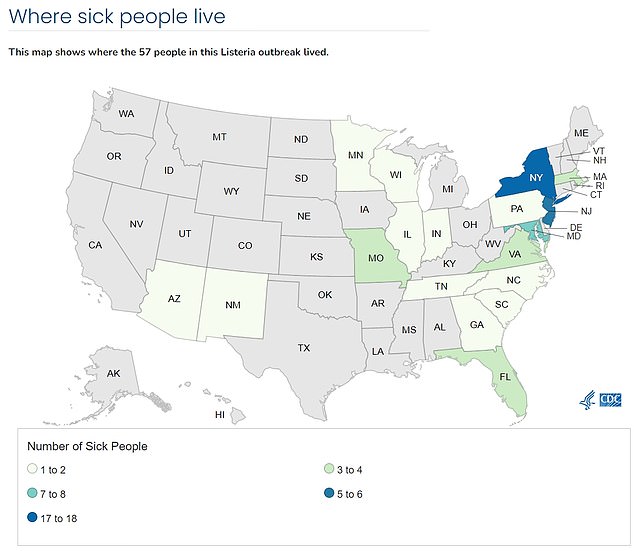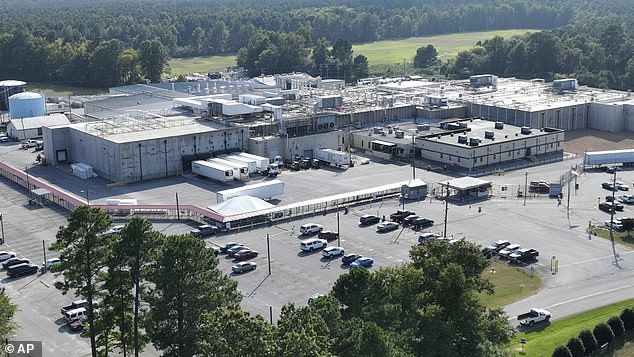A Virginia factory that produces Boar’s Head deli meats violated a long list of health regulations when inspectors found mold, insects and liquids dripping from the ceiling.
The company suspended operations at the plant in July, but the new records may shed light on what may have caused the current listeria outbreak, the largest since 2011.
Boar’s Head recalled 7 million pounds of meat in late July, from ham to liverwurst, after two people died and 13 people became seriously ill with an infection caused by the listeria bacteria.
The death toll now stands at nine, with at least 57 people in hospitals across 18 states, while food safety experts are calling the records some of the “worst sets of inspection reports” ever seen.
Agriculture Department officials who inspected the company’s largest plant in Virginia found dozens of instances of “noncompliance” with federal regulations on safe production practices over the past year, including several in recent weeks.
The company’s manufacturing plant in Virginia was found to have violated a long list of health regulations.

So far, nine people have died from listeriosis infection and 57 people have been hospitalized.
Violations included rusty equipment, mold on walls, “mud-like” substances and trash on equipment, meat residue on counters and equipment and “obvious” odors.
Food Safety and Inspection Service personnel toured the Jarratt, Virginia, plant in early August and discovered a number of health violations, including rusty equipment, mold on walls, meat residue on counters and equipment and “obvious” odors.
They described seeing black mold on walls and ceilings ‘with spots as small as the head of a pin and as large as a quarter,’ rusty knives and motors, meat residue splattered on countertops, slicers and inspection lines, and an ‘obvious’ smell of rancid, gray-tinged meat.
They also found standing water and condensation throughout the plant. Both conditions create an environment conducive to the proliferation of listeria.
Although inspectors found no evidence of listeria contaminating work surfaces, the bacteria is known to thrive in water and soil, as well as in cold, damp places like factory drains.
Bill Marler, a Seattle-based food safety attorney said USA Today: “This is the worst set of inspection reports I have ever seen”
The attorney said he expects to see more illnesses, and possibly deaths, since the incubation time for listeria can be up to two months, meaning people who ate Boar’s Head products in July could still be at risk.
Mr. Marler, who represents victims of the referendum, also said Congress should investigate the outbreak and how inspectors allowed unsanitary conditions to continue for so long.
U.S. agricultural officials say the plant will remain closed until “the facility can demonstrate it can produce a safe product.”

The map above shows the states where illnesses related to the listeria outbreak in deli meat have been reported.
The company has pledged to address all violations cited by inspectors.
It was not the first time inspectors had found violations of sanitation standards at the facility. An inspection in February found “large amounts of blood in pools on the floor,” evidence that employees had returned to work without washing their hands, and a buildup of meat and trash on the floor.
Garshon Morgenstein, whose 88-year-old father died from a listeria infection linked to Boar’s Head liver pate, said: ‘I think it’s disgusting and disgraceful… I’m even more shocked that this was allowed to happen.
‘For the rest of my life, I will have to remember my father’s death every time I see or hear the name Boar’s Head.’
Previous testing of unopened products by state health officials detected listeria in a sample of liverwurst, prompting the widespread recall of the product.
Since the sample was collected earlier this summer, Boar’s Head has recalled more than seven million pounds of 71 products commonly found behind deli counters in grocery stores nationwide.
In the same period, nine people have died from listeriosis, the infection caused by the listeria bacteria, while 57 have been hospitalized. The outbreak has affected 18 states.
Most people who get listeriosis do not become seriously ill, but about 1,600 people in the U.S. develop serious listeria infections, known as listeriosis, each year, and about 260 of those infections are fatal.
Bacteria can survive for a long time on countertops because they form a biofilm that sticks to hard surfaces, making it more difficult to ensure food safety.
Company spokeswoman Elizabeth Ward confirmed that all operations have been halted at the facility, saying: CBS that no product will leave the plant “until it meets the highest standards of quality and safety.”

Boar’s Head has recalled more than 70 products commonly found in supermarket deli counters nationwide.
Ward added: “During this time, we have partnered with the industry’s leading global food safety experts to conduct a rigorous investigation to get to the bottom of the events that led to this recall.”
The current outbreak is the largest since a 2011 outbreak linked to melons that killed 33 people and sickened 147.
In addition to causing flu-like symptoms, listeriosis can cause nausea, diarrhea and stomach cramps.
That was the case for Sue Fleming, 88, who lives with her husband Patrick, 76, in High Ridge, Missouri. Late last month, she ate a Boar’s Head liver sausage she had bought at her local supermarket.
She was rushed to the hospital, where tests confirmed a listeria infection, according to a lawsuit she filed against the company.
Ms Fleming spent nine days in intensive care and 11 in rehabilitation, but says she still suffers neurological symptoms and has not yet regained her full strength.

